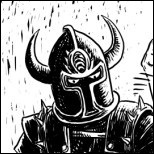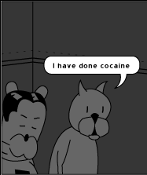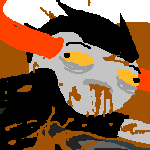|
Halloween Jack posted:I like Dying Earth fantasy--hell, for the past decade plus I pretty much only run fantasy Dying Earth style. Are there some good OSR products written in that style, with a "sci-fi and magic are indistinguishable" and/or adding high-tech gear to a fantasy setting? There's always been a few Expedition to the Barrier Peaks-style modules that scatter tech in your D&D, but for all the Vance is constantly cited as an Appendix N-type influence, I'm not aware of a OSR ruleset that actually does Dying Earth-type games at all, which is pretty weird. Pelgrane Press did a Dying Earth RPG (Robin Laws) back in '01, but I have no idea if it's any good, though it seems to have been well received. Xotl fucked around with this message at 18:22 on May 31, 2018 |
|
|
|

|
| # ? Apr 26, 2024 15:05 |
|
The Dying Earth RPG is wonderful (as is the Gaean Reach RPG), but they're pretty far off from D&D in terms of rules and campaign style. I mean, you can certainly base adventures on exploring ruins full of monsters to find miraculous loot, and it would be weird if you couldn't, but ah, you know what I mean.
|
|
|
|
Dying Earth RPG has a lot of material (like gazeteers) that you could probably repurpose for a different system, Goodman Games is working on a DCC Dying Earth and I'd say that a lot of DCC and Hydra Collective's Marlinko material is heavily Vance-inspired.
|
|
|
|
A Dying Earth setting is being worked on by Goodman Games for DCC too Edit:
|
|
|
|
Megazver posted:Dying Earth RPG has a lot of material (like gazeteers) that you could probably repurpose for a different system, Goodman Games is working on a DCC Dying Earth and I'd say that a lot of DCC and Hydra Collective's Marlinko material is heavily Vance-inspired. FMguru posted:The Robin Laws-authored core book is full of advice about not giving two shits about drawing a map, going with the flow, not worrying too much about conforming with the specifics of Vance's text, and having monsters be collections of rumored abilities that the GM decides the truth of when they're encountered. The supplements (largely not written by Laws) are full of gridded and indexed maps drawn from careful textual analysis, detailed monster descriptions, and adventures that tie in very specifically to the Vance stories. That said, I'm not planning to write a homebrew specifically for playing the Dying Earth in BECMI, or anything like that. I'm entranced with the Dying Earth as a subgenre of fantasy, and my own homebrew is picking up a lot of influence from sources as disparate as Clark Ashton Smith and old Japanese console RPGs.
|
|
|
|
If you're just worried about balance, i played in a science fantasy game once where most technological artifacts were nonfunctional or had degraded functionality in some way fluffwise and were just treated the same way as scrolls or wands. Anything with sustainable function needed to be constantly babied by the dedicated artifex class the GM cooked up and were more or less equivalent to spells. He just gated access to power levels at roughly the same rate as magical items and spells and it worked ok.
|
|
|
|
Yeah I'm assuming you want them to feel fantastic, but being overrun with ray guns and laser swords sounds a lot like being overrun with bows and metal swords. You could have them be fundamentally fragile or something if you wanted the party to constantly switch them around. (Limited ammo or a failure chance each round they are used might do it.) I would probably just let the party have and use them because they're cool.
|
|
|
|
Ever play Breath of the Wild?
|
|
|
|
Halloween Jack posted:I like Dying Earth fantasy--hell, for the past decade plus I pretty much only run fantasy Dying Earth style. Are there some good OSR products written in that style, with a "sci-fi and magic are indistinguishable" and/or adding high-tech gear to a fantasy setting? I got too hung up on the ruleset part and forgot about some perfectly good adventure settings, namely Misty Isles of the Eld (a pointcrawl with otherdimensional bastard elves and their magitech ships) and Anomalous Subsurface Environment (a very DCC-like megadungeon with definite tech elements).
|
|
|
|
I bet early Traveler modules could be used with a little tweaking too. As I recall, there were a fair number of basically dungeons in the form of abandoned facilities and crashed spaceships.
|
|
|
|
https://twitter.com/WeAreTheMutants/status/1002620190150914049 (apparently not actually becmi but this makes me wonder about old japanese dnd stuff)
|
|
|
|
Pollyanna posted:https://twitter.com/WeAreTheMutants/status/1002620190150914049 There is some interesting stuff about the Japanese version of the Basic Rules Cyclopedia here.
|
|
|
|
Pollyanna posted:https://twitter.com/WeAreTheMutants/status/1002620190150914049 If you have a Crunchyroll account, go watch Record of Lodoss War right now, as that anime is directly based on the creators D&D campaigns(although they eventually switched to their own system because TSR made some really bad decisions when it came to how they handled D&D in markets outside of the United States and Canada)
|
|
|
|
Has anybody seen or played the dcc book Black Sun Deathcrawl? I flipped through the pdf, and christ itís over the top bleak. I have no idea how it would actually be functional on the table, but there are some compelling bits in there.
|
|
|
|
andrew smash posted:Has anybody seen or played the dcc book Black Sun Deathcrawl? I flipped through the pdf, and christ it’s over the top bleak. I have no idea how it would actually be functional on the table, but there are some compelling bits in there. Honestly it's one of those books that's probably not meant to be actually run(except maybe as a one shot at a convention or something), and just something to steal some ideas from
|
|
|
|
I just looked it up and it's third-party, which explains why I'd never heard of it. It's specifically advertised as "The Blackest Nihilism for your DCC gaming!" so obviously the designer knew what he was going for, and any GM buying this should realize the same. Definitely not my thing, but at the same time I've never seen a book specifically designed to be run this way (not even Carcosa), so I'm kind of curious.
|
|
|
|
The pdf is *supposed* to be pay what you want /$8 for paper but the publisherís site was down when I looked for it. Given those circumstances I didnít feel bad for finding the pdf elsewhere. I donít think I could put a group together that would like the idea as a whole but the time traveling god that gets stronger every subsequent time you fight it because from its perspective you are slowly killing it and the weakened avatar of a god that fled the plane are both really great bits. andrew smash fucked around with this message at 14:06 on Jun 3, 2018 |
|
|
|
andrew smash posted:time traveling god that gets stronger every subsequent time you fight it because from its perspective you are slowly killing it This was the only bit I thought was any good, honestly. I agree with the idea that it seems like at best a one shot thing. Honestly not sure if the sheer bathos of that one mutation where you're constantly drinking your own urine which is also your brain is intentional.
|
|
|
|
The mutation table entry that causes you to un-mutate to the base form of a pc race and gain the relevant benefits but get a permanent-6 penalty to all rolls due to the crushing despair of being confronted with everything you have lost is pretty funny honestly
|
|
|
|
How exactly does one run an OSR game, having no real understanding of one? It's an interesting thing I've noticed, and most advice is really vague.
|
|
|
|
I would probably start by reading A Quick Primer for Old School Gaming, then ask more specific questions about specific systems you are interested in.
|
|
|
|
PRINCIPIA APOCRYPHA: Apocalypse Engine-style Rules And Principles For Running OSR Games
|
|
|
|
thefakenews posted:There is some interesting stuff about the Japanese version of the Basic Rules Cyclopedia here. Aw gently caress yeah. This is super cool to see, and I love old Japanese fantasy stuff. It remind me a little of Ragnarok Online  (yes, I know RO is Korean) (yes, I know RO is Korean)drrockso20 posted:If you have a Crunchyroll account, go watch Record of Lodoss War right now, as that anime is directly based on the creators D&D campaigns(although they eventually switched to their own system because TSR made some really bad decisions when it came to how they handled D&D in markets outside of the United States and Canada) Iíve been meaning to watch Lodoss for a while now, but I donít have a Crunchyroll account (Iím cheap). Maybe this will finally make me get one. Iím also totally getting the new Lodoss game when (if) it comes out.
|
|
|
|
WiiFitForWindows8 posted:How exactly does one run an OSR game, having no real understanding of one? It's an interesting thing I've noticed, and most advice is really vague. I've been meaning to cover that in the playstyle post I reserved on the first page. I find the primers are useful, but mix in too much generic advice (or what sounds like it) that should apply to any ideally good game, or make it come across as pointless elitism/grogism. Old-school games are a bit of mechanics, but more so a playstyle and inherent set of assumptions. I'll add some basic stuff here. Note that when I say old-school I mean D&D of about 1983 and earlier and, more specifically, as the game was intended to be played by its creators. Playstyle begins to shift around after this point, based on offical modules and Dragon magazine articles putting out a different kind of content, new designers coming in and the old guard leaving or getting fired (there were major hiring waves and purges at TSR at this time which rapidly changed the design character of the company), and so on. That's 1st ed AD&D, B/X, and OD&D. After this period you see a decreased emphasis on many of these points and an increased emphasis on new things. Lastly, I want to emphasize that this is a taxonomical description, not a proscription. Play how you want; this just happens to be what old-school play was *supposed* to be like (again, going by design intent). At the same time, remember that the scene stopped being monolithic as soon as it expanded beyond Lake Geneva and people were just as happy to house-rule then as they are now; overall there were a decent variety of playstyles based on regions and of course individual GMs even back in the day. I'm just aiming at a broad set of accurate generalities for OSR play specifically. 1) Balance is nebulous. You don't run into liches on the 1st level of any module. At the same time, there's no challenge ratings, and wandering monster tables can throw something at you that will slaughter you in no time; you're assumed to bargain or run for your life when these occur (hence the playstyle divide between new-school and old that is often summed as combat as war vs. combat as sport). Treasure is often random: you might make out a like a bandit with a good roll (including with magic items). Lots of things are random. 2) XP primarily from gold, not combat. This makes the game about treasure hunting, not killing things. It's so simple, but so huge in terms of shifting gameplay style. You often try to avoid fights (doubly so when you consider this with #1; there's no guarantee that the encounter is a "level-appropriate" encounter). There's a saying in the OSR that "combat is a failure state", i.e. it's a penalty that ultimately says you did something wrong (you didn't bargain right, or you didn't avoid them when you should have, or trick them into moving off or running away, and so on). That can be overstated, but at the heart of things it's correct. It's also funny because old-school D&D has a reputation as a hackfest, when that's the charge old-school players level against modern (2nd ed+) D&D and its combat = progress design philosophy. 3) Reaction and Morale. With these rules, creatures now talk and bargain and threaten and flee and all sorts of other interesting things, rather than just exist to be killed. When combined with #2, you get a much different playstyle involving encounters. Yes, you could work this into any game, but in old-school D&D the game mechanically puts this into play (though it's easier to do and appears more prevalently in some editions than others). 4) Resource management. This is one of those things inherent in old-school D&D that modern players have tended to dismiss as pointless tedium and modern designers have steadily removed. In modern games, healing is something that happens with trivial ease, and there are at-will powers; none of this exists in old-school games. Modern games often handwave your ammunition, your food, your encumbrance, and your light sources. Old-school games require all this to be tracked. There are no 0-level cantrips and free magic items that create all the light you ever need. Now you need to think about who is holding the torch or lamp. Do we hire a torchbearer to keep our hands free and maybe carry more stuff? We better protect him, because he's some NPC schlub. Time ticks down in those ten-minute portions, and is watched carefully, because it means that your lamp has that much less light in it, and you're that closer to a wandering monster check (which are assumed to be in play constantly: they exist to prod players onward, and to consume resources). Why track this, then? Because a) it reduces the amount of treasure you can carry (and so in turn the amount of XP you can earn; see #2) and b) it makes numerous threats have meaning that wouldn't otherwise. This inherently shifts play from a heroic style to a more cautious exploration style, where the players are constantly measuring the risks of moving on with the potential rewards. 5) Player agency. This is a good example of one of those bits that on the surface could sound like generic advice without further context, and something I've touched on a bit in earlier posts--I mean, players should always have agency, right? Modern adventures are largely plot-oriented. You have to do this, and you have to do that, and NPCs have to appear at X time, and sometimes can't be killed until the story said it's time for them to die, and if players can't figure something out then the plot often says to just give it to them anyways because the plot also says they need to figure this thing out. The GM has become more and more of a storyteller, with increasing amounts of read-aloud text to narrate to the players that tells them how they feel and what they are doing. Entire modules exist where the players' actions are literally meaningless. If you're running an old-school game, hard-coded plot is de-emphasized as much as possible. There can still be story, in that NPCs are doing things, stuff is happening, action and reaction and consequences exist. But when any of this collides with the players, nothing is guaranteed. There is nothing that is "supposed to happen". If you have a module that says that Lord Darkulon is readying his fell legions to conquer X, players may go "wow, sucks to be those guys: anyways, moving on" (though they may regret this later, but that's on them; agency doesn't mean freedom from consequences). If they instead decide to tackle it, and come up with a clever way of killing Lord Darkulon in the bath a week into his plan of ultimate conquest, then you go "cool" and throw the rest out. The players beat that challenge fair and square, and the fact that it torpedoes all this other material is irrelevant. Now you might say "all well and good, but this is a game and there's a clear social contract that says that this is the adventure I have ready and if you want to tell me to go to hell when I propose it then that's fine, but then we have nothing to do tonight, because this is a game and this is the content I've worked up". What is needed is to change your set of expectations as a GM. You don't come to the table with a bunch of plot-based scenarios in the first place. Instead, you are readying dungeons and other encounters that don't force the players' hands by mandating action. The social contract then shifts to them, as the flipside of player agency being dominant: "look, this is a game of exploring and looting, and you're explorers and looters, so you shouldn't need all this crap telling you *why* you need to go and explore and loot the Temple of Xlkjjl: just go and do it". Some old-school games are based entirely around what's known as a hexcrawl, which means that there is no one place to explore per session, but instead a whole land of brief encounters divided into hexes, seeded with more fleshed out dungeons here and there, and the players just explore it as they will. "What do you do today?" "We've decided to head east, to check out the rumours about that strange plague that's appearing." The GM doesn't dictate the action; they only facilitate it. This plays out radically different at the table than your typical later edition game. A more directionless set of players (or those trained by later modules to expect the adventure to be handed to them with bells and whistles on it) will likely find it boring, because they won't do what the game presumes they will, because they'll in turn have no reason to think it can or should work that way. It's thus vital that both the GM and the players understand this point more than any other, or your game will fall apart no matter what else you have right. A subset of this is that players don't have to be heroes. With plot often comes assumed heroism, because plot tends to be good at making heroic style of games where the PCs rescue or thwart something. At low levels you're saving villages and caravans. Then you move up to saving towns, then cities, then kingdoms, then the world. Instead, the players may be heroes, if they choose that path and work towards it, but it's up to them. The default is that they're simply explorers trying to get rich (gold for XP). 6) Life is cheap. This is often confused with antagonistic GMing, because death is one of the things an antagonistic DM delights in inflicting, but also because modern games have downplayed this. Rather, it's just that characters take 5-10 minutes to make, lots of danger is assumed, and there's a good chance that death will happen at the table. The GM lets it happen if it happens, accepting that it's an inherent part of the game. He doesn't go out of his way to kill characters, but neither does he fight to save them; that's not his job. Players in turn accept they they could croak at any time and are ready to roll up a new character without complaints. 7) Magic is magical. You can't easily make magic gear (or might not be able to at all). You can't buy it in shops. Any magic items you do get are assigned at random and you make the best of. Some of it may be cursed. There's no Knowledge: Arcana skill. There might not even be an Identify spell, depending on the ruleset; that's what sage NPCs are for. The game does not assume you have X amount of magic gear at X level. OSR writers in particular delight in creating non-standard magic items with weird and mythic-style effects. 8) Player skill over game skill. There aren't a lot of rules for characters in old games. Your sheets are pretty simple. There's no universal task resolution, except for the occasional handwaved bit. There's no skills (loose and optional systems begin to creep in in the mid 80s, but they're widely disliked; see below). You don't have much in the way of special abilities. This means that the player is generally the one overcoming challenges, rather than the mechanics your character possesses. It's easy to dress up this as elitism, but it's really a matter of making a virtue out of necessity: since there are no rules for it, what else are you going to do? It's a simple concept, but like many of these it has wider implications. Reading an old-school module, you'll see more things that state the challenge, but comparatively little about the "right way" to overcome it; what is there along those lines won't be mechanical "pass a DC 15 check to find the book on the shelf" but just simple statements about maybe a few things that would or would not work. It's assumed that if the players can think of a better way to do things, then they can do that. There's no perception mechanics, so it's up to the players to actually describe what they're doing; depending on the GM this can be as simple as "I search the room", but is assumed to be more like "lift the rug", and "I examine the bookshelf closely". There's no social skills, so you have to roleplay out your encounters instead of "I make my Bribery roll / Diplomacy check". Again, this can happen in any game, but in old-school play it's assumed and actively built in. Plenty of old-school players see this as a feature, not a bug, arguing that it results in fast play and, more importantly, when you add abilities (such as skills) what you're really doing is directing players increasingly towards their character sheet and their rulebook, rather than encouraging them to use their imagination. They argue that after a certain point you actually remove possibilities, as people begin to shift from seeing the rules as a set of guidelines for the most common actions and instead an exhaustive list of everything possible; when a rule is missing, players assume the action to be impossible. It's why you see older players often react with hostility when you suggest adding more combat options, skill lists, and so on: in their mind you're missing the point and inadvertently making the game more restricted. Xotl fucked around with this message at 07:06 on Jun 4, 2020 |
|
|
|
Of course it's worth mentioning that those are less hard rules and more guidelines that can be followed or ignored as needed
|
|
|
|
Only to a degree. We're talking about how the game used to be played (allowing for outliers), and that's objective. These elements have meaningful effects on your game, and out of all of them I'd argue that only #3 and some of #7 can be dropped with you still being able to say you've got an old-school game. People played 1st ed and BECMI who abandoned #4 (myself included), but it's a markedly different type of game, one that wasn't common in ye olden times (as any look at the modules released up to 1981 show). It's not about what's right or wrong, it's about attempting to define a playstyle. If you think those elements suck, then don't use them. At the same time, you could be playing out of the 1st DMG, but if you've houseruled it so that you've got infinite light, magic shops, no time tracking, quick rests to recover HP, and death being really unlikely, then you're not really playing old-school (which, again, is fine, because god I hate those "this is objectively the right way to play a game" arguments). It's not a matter of what's better, or what's more fun. Xotl fucked around with this message at 23:18 on Jun 3, 2018 |
|
|
|
Xotl posted:The social contract then shifts to the players, as the flipside of player agency being dominant: "look, this is a game of exploring and looting, and your explorers and looters, so you shouldn't need all this crap telling you why you need to go and explore and loot the Temple of Xlkjjl: you just go and do it". This is pretty much the entire basis of my BX-inspired game You All Meet In A Tavern, which I mentioned a while back. Roll up your characters (which should hopefully take two minutes or less), then meet the patron in the aforementioned tavern who tells you what you're being asked to do in tonight's game and what victory condition you need to 'win' it. It might be something fairly open-ended like "find out what happened to the missing villagers", or very specific like "enter Castle Deathmaw and kill Lord Blackskull!" It's probably because I never actually got to play in an ongoing campaign back in the 80s, but to me the old "here's a new module, roll up a PC of the right level and let's go exploring" mode of play is the default.
|
|
|
|
Payndz posted:This is pretty much the entire basis of my BX-inspired game You All Meet In A Tavern, which I mentioned a while back. Roll up your characters (which should hopefully take two minutes or less), then meet the patron in the aforementioned tavern who tells you what you're being asked to do in tonight's game and what victory condition you need to 'win' it. It might be something fairly open-ended like "find out what happened to the missing villagers", or very specific like "enter Castle Deathmaw and kill Lord Blackskull!" I'm going to go and download this now. Thanks. 
|
|
|
|
Xotl posted:Lots of great stuff I really appreciated this list, even with the caveat it's not hard and fast. It spelled out why I enjoy the OSR style without being the least bit antagonistic. I feel like random treasure is a huge feature that doesn't get explored enough, so I'm glad you brought it up. Speaking of, what's a good way to handle potions? Is it always a guess as to what a given potion does? And how do you avoid the identification song and dance where the players smell it, taste it, etc.? Should all healing potions smell like oranges and heal minor cuts on taste? It just seems a silly ritual after the first one if that's the case.
|
|
|
|
A Strange Aeon posted:I really appreciated this list, even with the caveat it's not hard and fast. It spelled out why I enjoy the OSR style without being the least bit antagonistic. Thanks. I hate that "one true way" crap. quote:Speaking of, what's a good way to handle potions? Is it always a guess as to what a given potion does? And how do you avoid the identification song and dance where the players smell it, taste it, etc.? Should all healing potions smell like oranges and heal minor cuts on taste? It just seems a silly ritual after the first one if that's the case. For me it depends on your players and the game. The way I see it there's two options: you takes your chances, or you properly identify it. One of my group really loves the "chaos reigns" part of old-school play and generally just chugs the stuff; if you die, oh well. But the less impetuous are more interested in finding out what it will do, because what's the point of finding out you downed a potion of flight if you don't need it at that point? I don't have the Identify spell in my personal homebrew: players are quick to search out the nearest sage who knows this stuff, which at once helps keep magic mysterious and serves to help use up all of the coin that the players have coming in. As for standardization, I do that only for the most common potions (like healing), and only to a certain area: in different places they'll use different ingredients, and so the healing potion of people X is different than those of people Y. It helps prevent a creeping reliable sameness from entering your world.
|
|
|
|
So, question: No OSR politics = no OSR drama? I dont mind chuckling at watching these creators have a loving meltdown over nothing.
|
|
|
|
I really appreciate play not getting bogged down in rules checking and crunch. One of my strongest impressions of playing 3.5 back in college was how little I got to actually explore and exercise my imagination and how much of it was book keeping.
|
|
|
|
-nvm-
|
|
|
|
WiiFitForWindows8 posted:So, question: I think drama is fine, I'd just like to avoid having to discuss how this thread is ~problematic~ every couple of pages or so.
|
|
|
|
Oh well, has anyone seen Patrick Stewart(Veins of the Earth) having a meltdown over someone else using his book to create a hexcrawl? http://falsemachine.blogspot.com/2018/05/i-officially-dont-give-gently caress.html This is apparently in response to a..decent OSR creator named Skerples who made a Veins of the Earth hexcrawl. He took Skerps off of his blogroll and when Skerps asked why, he said Skerps had 'colonized' his setting toolkit for using it as a setting toolkit and producing a setting with the tools in said kit.  All while vomiting praise all over Patrick and driving sales for his work All while vomiting praise all over Patrick and driving sales for his work   https://coinsandscrolls.blogspot.com/2018/05/osr-diy-d-veinscrawl-and-you.html
|
|
|
|
Skerples just makes some people extremely angry. On a good day, just the letters "sker" can destroy an /osrg/ thread.
|
|
|
|
I assume that means patrick didn't like what he made and doesn't want people thinking of that when they think of Veins of the Earth.  I can imagine being pretty sensitive to that, especially when that book is like, a cross-section of someone's very bizarre headspace like Veins is. I can imagine being pretty sensitive to that, especially when that book is like, a cross-section of someone's very bizarre headspace like Veins is.If I wanted to speculate I'd guess that skerple's style is too mundane for him. Maybe I'm projecting since that was how I felt reading through that hexcrawl - it softened the bizarre hair-raising edge of that book, which was one of its defining features.
|
|
|
|
Hey there, I spotted Dungeon Crawl Classic at a gaming store and this happened to converge with a friend of mine back home who did the same at his store. Twice a year I go back to my hometown and while I'm there get together with my old group to run a oneshot of some new system or other, so I'm thinking this might be a good candidate. 3rd edition was really more my entry point into gaming as a teen but I did have a taste of 2nd and a bit of nostalgia for it, and my friends are much the same way. It can be tricky running these oneshots for them though and while I find the old-school idea interesting I'm leery about pulling it off on the first (and possibly only) try. Is there any advice for how the game works for a fairly large (6-8 players) one-off? The pack of zero-level characters for example sounds like it'd be pretty unmanageable unless that's all the session was about. These guys are mostly combat-oriented and forget each others' in-character names basically immediately and my biggest problem is always trying to keep everyone engaged so no one feels left out, bored, and starts messing around on their phone. Last Christmas we played Fantasy Flight's Edge of Empire Star Wars game and I was struggling to find something for everyone to do on their starship during a TIE attack, so avoiding getting bogged down like that would be great.
|
|
|
|
Dolash posted:Hey there, I spotted Dungeon Crawl Classic at a gaming store and this happened to converge with a friend of mine back home who did the same at his store. Twice a year I go back to my hometown and while I'm there get together with my old group to run a oneshot of some new system or other, so I'm thinking this might be a good candidate. The way it generally works in practice is that you have a favorite character or two, so you keep them safe (and earning XP) while sending your worst dudes out in front to get survival-of-the-fittest'd. You're not really actively playing 3-4 characters most of the time, but they're around if you need to - for example - gang up on a critter, or if someone comes at you from behind. Each of my players put up a "lead" character and everything that happened was just assumed to happen to them first, barring a darn good reason otherwise. Character names will devolve into, for example, breakfast cereals. So there's no worry there either. (e: And 1st+ level characters in DCC are both durable and interesting. The design is a lot more innovative than they pretend it is.)
|
|
|
|

|
| # ? Apr 26, 2024 15:05 |
|
I'm a bit worried about giving them all a bunch of zero-level characters, since rolling a ball of 21-24 shallow peasants around sounds like it'd make individual initiative difficult and I tend to lose these guys unless they're all regularly getting opportunities to take actions that hold their attention. I could maybe make it constant combat and try to whittle the group down quick to leave time for a regular adventure afterward - is the zero-level stuff typically a whole session or more like an extended character creation sequence?
|
|
|

























